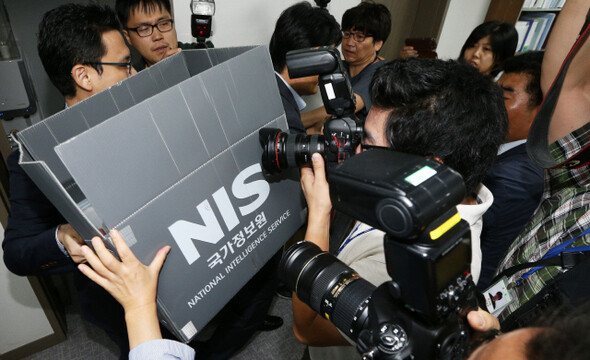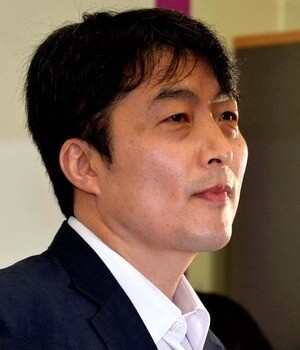hankyoreh
Links to other country sites 다른 나라 사이트 링크
Why has the NIS chosen now to raid progressive lawmakers?

By Kim Nam-il, staff reporter
The National Intelligence Service (NIS) searched and seized documents from the offices of Unified Progressive Party (UPP) lawmaker Lee Seok-ki on Aug. 28. Lee and nine others are suspected of conspiring to overthrow the government.
The details of the charges brought against Lee and the others are shocking: they include allegations such as “bringing together firearms” and “striking major facilities”. If Lee and the others actually had the anachronistic delusion of planning to foment an insurrection, they must be prosecuted according to criminal law.

A number of political interpretations are being offered as to why the NIS chose this moment to raid Lee’s offices at the National Assembly and claim that the lawmaker was planning to lead an insurrection and threaten constitutional order. Nowadays the Blue House and politicians from both sides of the aisle agree on the need to reform the NIS.
When the regular session of the National Assembly begins in September, the NIS is scheduled to submit the plans for reform that it has prepared. While the details of the NIS’s reform plan have not been revealed yet, there is a high likelihood that they will not include the dissolution of the domestic investigative wing of the agency and the revocation of its right to investigate communist activity, reforms that the opposition party and civic groups have called for.
Meanwhile, the opposition party is linking the reform of the NIS to its political activity outside of the National Assembly, while the manifestos published by religious and academic figures and the candlelight protests in which ordinary citizens are participating show no signs of fading.
It is entirely possible that the ruling party, which needs the cooperation of the opposition party in order to pass legislation for public welfare, will accept some parts of the reform plan submitted by the opposition party while the bill is being debated in parliament. With even the Blue House and the ruling party stepping forward to state that some reduction of the NIS structure is inevitable, the NIS is facing considerable pressure as part of the most serious crisis in its existence.
It is for this reason that observers are asking whether the NIS did not have some ulterior motivation in targeting the “weakest link” of the UPP and the Gyeonggi Dongbu Alliance at this point in time. These organizations could have been charged at any time.
"Lee Seok-ki is already an open book, and he was only too easy of a target for a anti-communist investigation by the NIS,” said a source who is very familiar with the internal structure of the NIS and spoke on condition of anonymity. “This investigation looks suspiciously like an attempt by the NIS to justify its existence. It may be intended to block efforts to reduce and eliminate the agency’s domestic and investigative branches, which are its heart.”
It would have been adequate for the prosecutors or the public security division of the police to take charge of a case such as this one that involves South Koreans, and in particular politicians, the source said, suggesting that the NIS must have had another reason for taking direct action like this.
When the NIS released the transcript of the 2007 inter-Korean summit without authorization on Jun. 24, many people viewed this as the personal decision of the NIS’s director, Nam Jae-joon. But this case, some analysts suggest, was not so much Nam’s decision as a concerted effort by the agency as a whole, and in particular by its domestic and investigative branches.
Inside the NIS, the domestic and investigative branches are the main parts. More staff is concentrated in these branches and agents there get promoted first. The argument is that this investigation may have been spurred by these branches’ survival instinct.
On the other hand, there are also analysts who suggest that Nam’s assessment of the situation played a greater role in the transcript release. Nam has acted very conservatively before, as when he released the inter-Korean summit transcript without authorization.
After releasing the transcript, Nam was quoted as saying, “Since the opposition party keeps attacking us, I [released the transcript] to defend the honor of the NIS.”
It is a strange coincidence for the NIS to make its move only two days after President Park Geun-hye declared on Aug. 26 that, “the National Intelligence Agency will definitely be reformed.” Some observers are even saying that the move was a demonstration aimed at persuading Park to acknowledge the important role played by the NIS.
The suggestion is that this investigation is an attempt to remind Park of the agency’s reason for being immediately before its reform plan is presented. The agency may be trying to preserve fundamental privileges that prop up its influence, such as the right to collect domestic information and to investigate the suspected communist activity.
Indeed, it was reported that the NIS had been carrying out the investigation into Lee for three years. The fact that the agency had been sitting on the main allegations for a long time and only embarked on the public investigation now requires some explanation.
Responding to this, NIS spokesperson Ha Kyung-joon said, “This kind of investigation doesn’t just happen overnight. When embarking on a public investigation, we have to secure all of the evidence supporting the allegations first. The agency was even subjected to a parliamentary hearing. There is no reason why the timing of the investigation should be viewed as suspicious.”
“Considering that the NIS got a warrant from the courts and entered the lawmakers’ building at the National Assembly, it appears that they were fairly confident in the evidence for their charges,” said a Saenuri Party (NFP) lawmaker on condition of anonymity. “It is a stretch of logic to view this investigation as the NIS trying to justify its existence.”
But the lawmaker also said, “If there is no decision when we get to the actual trial, it would be possible to suspect the NIS of political motivations. In particular, if the NIS cannot present decisive evidence showing a link to North Korea, it will be criticized for having made a clumsy effort to turn the tables when it was backed into a corner.”
Exactly five years ago, on Aug. 27, 2008, the NIS revealed what became known as the Won Jeong-hwa female spy scandal, which involved a North Korean spy who came to the South posing as a refugee. She provided reports to North Korea after dating officers in the army and teasing out classified information from them.
Some of the defendants in that case were later found innocent in the courts. The case came to light during the candlelight protests against the import of US beef and the ensuing security crisis during the first year of Lee Myung-bak’s presidency.
This is why some people suspect that the new line of public security officials made up of former public security prosecutors Blue House Chief of Staff Kim Ki-choon, Blue House Senior Secretary for Civil Affairs Hong Kyung-shik, and Justice Minister Hwang Kyo-ahn is starting to influence affairs of the national government with their hard-line stances.
Please direct questions or comments to [english@hani.co.kr]

Editorial・opinion
![[Correspondent’s column] The real reason the US is worried about Chinese ‘overcapacity’ [Correspondent’s column] The real reason the US is worried about Chinese ‘overcapacity’](https://flexible.img.hani.co.kr/flexible/normal/500/300/imgdb/original/2024/0510/5217153290112576.jpg) [Correspondent’s column] The real reason the US is worried about Chinese ‘overcapacity’
[Correspondent’s column] The real reason the US is worried about Chinese ‘overcapacity’![[Editorial] Yoon’s gesture at communication only highlights his reluctance to change [Editorial] Yoon’s gesture at communication only highlights his reluctance to change](https://flexible.img.hani.co.kr/flexible/normal/500/300/imgdb/original/2024/0510/7717153284590168.jpg) [Editorial] Yoon’s gesture at communication only highlights his reluctance to change
[Editorial] Yoon’s gesture at communication only highlights his reluctance to change- [Editorial] Perilous stakes of Trump’s rhetoric around US troop pullout from Korea
- [Guest essay] Preventing Korean Peninsula from becoming front line of new cold war
- [Column] The state is back — but is it in business?
- [Column] Life on our Trisolaris
- [Editorial] Penalties for airing allegations against Korea’s first lady endanger free press
- [Editorial] Yoon must halt procurement of SM-3 interceptor missiles
- [Guest essay] Maybe Korea’s rapid population decline is an opportunity, not a crisis
- [Column] Can Yoon steer diplomacy with Russia, China back on track?
Most viewed articles
- 1[Correspondent’s column] The real reason the US is worried about Chinese ‘overcapacity’
- 2[Editorial] Yoon’s gesture at communication only highlights his reluctance to change
- 3Yoon rejects calls for special counsel probes into Marine’s death, first lady in long-awaited presse
- 4[Book review] Who said Asians can’t make some good trouble?
- 5Nuclear South Korea? The hidden implication of hints at US troop withdrawal
- 6Korea likely to shave off 1 trillion won from Indonesia’s KF-21 contribution price tag
- 7[Column] “Hoesik” as ritual of hierarchical obedience
- 8[Column] S. Korea’s low birth rate means its no time to gamble with the future
- 9Young Koreans vent rage over working hours already all too grueling
- 10When and why did Koreans go from anti-American to pro-US?